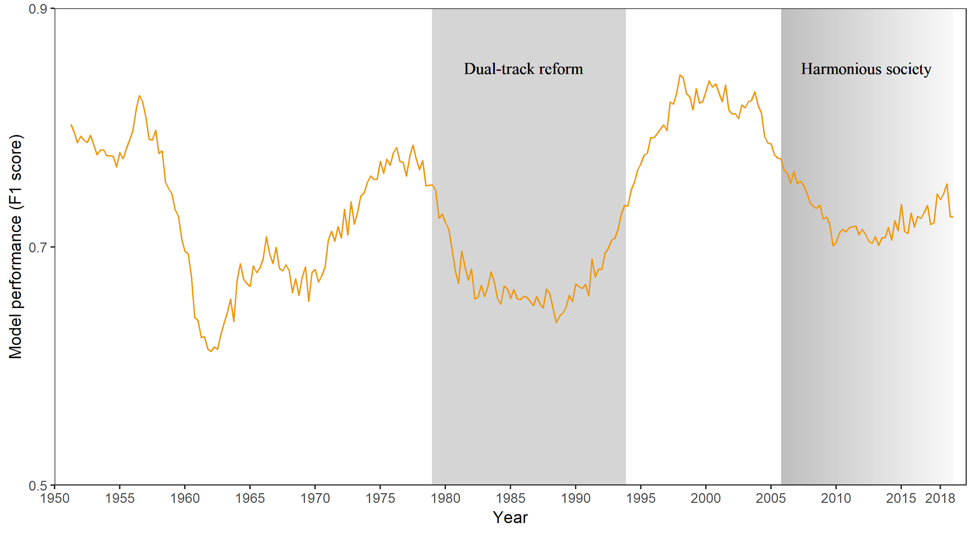Three-pointer:
Understanding China’s structural issues using the PCI,
Examining how policy change isn’t policy uncertainty, and
Presenting the PCI at the Strata Data Conference in London.
Dear Human Readers,
The Policy Change Index (PCI) for China provides a new angle to understand China’s structural issues — a thorny obstacle standing between President Donald Trump and President Xi Jinping in the trade talks. As Julian TszKin Chan and Weifeng Zhong discuss in the China Business Review, these issues are rooted in a half-hearted reform agenda China has been subscribed to for over a decade.
The PCI predicts changes by picking out front-page articles. But training a good model to do that requires the newspaper, and the government, to have a clear agenda. When conflicting priorities exist, the algorithm is confused.
Poor model performance signals policy confusion
The figure above, which shows how well the PCI model is trained, picks up two recent episodes of policy confusion where the performance is relatively low: the well-known “dual-track” reform in the 1980s and the “harmonious society” initiative started in 2005. The latter, which attempts to maintain market reforms while using government intervention to tackle social problems, lingers well into Xi’s administration.
Trump said he could walk away from a weak offer from China. Well, he’d better be prepared to do that because China’s structural issues are not going anywhere anytime soon.
COMMUNITY NEWS
Change isn’t uncertainty. In a recent paper, Yun Huang and Paul Luk of Hong Kong Baptist University construct an economic policy uncertainty index for China by counting relevant keywords in Chinese newspapers — a method originally developed by Scott Baker, Nicholas Bloom, and Steven Davis in 2016. Interestingly, the authors find, among other things, that their index does not correlate with the PCI. The underlying reason is a subtle yet important distinction: While the realization of uncertainty can be a change, changes that are planned and deliberate — as is often the case in policymaking — may not contain uncertainty.
Happy birthday, Professor Pierre Perron! Today is the 60th birthday of Perron, an econometrician known for his work on understanding the importance of structural changes in testing the persistence of random shocks. An econometrics conference is taking place — as we speak! — to celebrate his birthday, and Chan will present the PCI project there.
WHAT'S NEXT
Strata Data Conference in London. Artificial intelligence, machine learning, and big data implementation in business are the focus of this O’Reilly conference next month. Besides diving into novel techniques, the conference also features plenty of talks on policy, legal, and ethical issues involving the application of these techniques. Zhong will present the PCI project at this exciting event.
WHAT WE'RE READING
Big Brother is listening. In 1936, the famous composer Dmitri Shostakovich was condemned by Pravda because, apparently, an opera of his was “coarse, primitive and vulgar.” The denunciation caused such a hardship to Shostakovich’s life that he had to change gears and toe the party line — with his music. His Fifth Symphony, for example, was considered much more “socialist” and to the authorities’ liking. Yet, if you listen carefully to how the last movement ends, you can still sense the reluctance the composer didn’t completely hide.
Edited by Weifeng Zhong and Julian TszKin Chan





